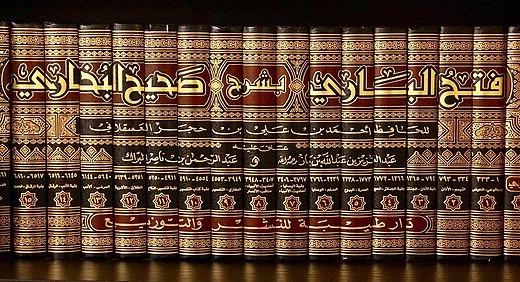Eloquence Evidences in “Fatah Al-Bari” by Al-Asqalani
شواهد الأمر البلاغية في "فتح الباري" للعسقلاني
Keywords:
Arabic Language & Literature i.e. Linguistics, Syntax, Morphology, Rhetoric, parablesAbstract
The book “Fath al-Bari Sharh Sahih al-Bukhari” is one of the most valuable source of Hadith Sciences. At the same time it is a unique book for the sciences of the Arabic language as well. As it comprises almost aspects of Arabic Language & Literature i.e. Linguistics, Syntax, Morphology, Rhetoric, parables and different stylistic approaches which make this book a very notable and remarkable in the field of Arabic Language & Literature.
This book has gained the attention of readers due to the goals and meanings explained in this book. This book has revealed the brilliance and intellectual understanding of Al-asqalani about the Arabic rhetoric.
The rhetorical notes Al-Asqalani mentioned were not in the form of rules or laws linking them with the evidence, as much as they were a method used by Al-Asqalani to clarify the meaning of the hadith.
Al-Asqalani mentioned most of the terms and rhetorical arts without indicating their definition or limitation, except for some of them, such as rhetoric, news, simile, and turning around.
This book explains how Al-asqalani had analyzed the texts of noble hadiths, the explanations of hadiths, and impact of hadiths on the human soul in terms of emotions, imaginations, instincts and inclinations. This research article will try to study the rhetorical evidence of the matter in this research by relying on what he said in his commentary on the noble hadiths of the Prophet (PBUH).
References
Darwyš Al-ǧundī Ilm Al-mʿānī (P: 33-34).
Ibn Manẓūr: Lesān Al-Arab (5: 86).
Abū Al-ḥasan Aḥmad Bn Fāres: Muʿǧam Mqāyis Al-luġhaẗ (1: 137).
Yūsuf bn Abī Bakr Al-sukākī: Meftāḥ Al-Ulūm (P: 152), Al-īḍāḥ (1: 143).
Alī Bn Hamzẗ Al-alwy: Al-ṭrāz Al-mutaḍmmen LeʾAsrār Al-balāġẗ ūʿlūm Haqāʾiq Al-iʿǧāz (3:281-282).
Aḥmad Maṭlūb: Al-balāġẗ Wāltaṭbīq (P: 124).
Ibn Haǧr Al-asqalānī: Fatḥ Al-bārī Sharḥ Saḥīḥ Al-bukẖārī (13: 415).
Ibid. (13: 416).
Abū Al-ḥasan Alī Bn Muḥmmad Bn Alī Al-ǧurǧānī: Al-taʿrīfāt (P: 20).
Sūraẗ Al-qamar (50).
Fatḥ Al-bārī (13: 646).
Qaīs Ismāʿīl Al-ʾaūsī: Asālīb Al-ṭalab enda Al-naḥweyīn Wālbalāġyin (P: 113).
Lesān Al-Arab (3: 222).
Fatḥ Al-bārī (7: 388-389) H# (3984).
Al-zamakẖšharī: Al-kašhāf (2: 52).
Fatḥ Al-bārī (11: 102) H# (6296).
Ibid. (2: 213-214) H# (684).
Maqāyis Al-luġhaẗ (3: 293).
Fatḥ Al-bārī (2: 214).
Abū Aūs Ibrāhīm Al-šhamsān: Al-ǧumlaẗ Al-šharṭīẗ End Al-nuḥāẗ Al-arab (P: 211-214).
Ibn ʿAqīl: šharḥ Ibn Aʿqīl(2: 237).
Fatḥ Al-bārī (7: 51-58) H# (3683).
Ibid.
Ibid. (10: 616).
Abū Bakr Ibn Al-sarrāǧ Al-baġhdādī: Al-uṣūl Fī Al-naḥū (2: 134).
Fatḥ Al-bārī (10: 125-126) H# (5639).
Ibid.
Aʿbd Al-qāder Bn Uʿmar Al-baġhdādī:Kẖezānẗ Al-Adab Wa Lubbu Lubāb Lesān Al-ʿrab (3:372), (6:238-239).
Mūaffaq Al-ddīn Yaīšh Bn Alī: Sharḥ Al-mufṣsal (4: 45-47).
Tamām Hassān: Al-luġaẗ Al-arabīẗ Mʿnāhā Wa Mabnāhā (P: 113-116).
Fatḥ Al-bārī (11: 355-359) H# (6463).
Ibid.
Dhīaʾ Al-ddīn Ibn Al-āṯhīr: Al-maṯhal Al-ssāʾir Fī Adab Al-kātib wālšhāʿr (2: 301-302).
Fatḥ Al-bārī (13: 416).
Ibid. (11:68-71) H# (6266).
Ibid.
Jamāl Al-ddīn Muḥmmad Bn Mālik Al-āndalusī: Al-meṣbāḥ Fī Elm Al-mʿānī (P: 45), Uqūd Al-ǧumān (P: 60).
Jalāl Al-ddīn Abd Al-raḥman Al-ssīūṭī: Al-itqān Fī Ulūm Al-qurʾān (2:11), Muʿtark Al-ʾaqrān (1: 335).
Al-īḍāḥ (P: 85).
Fatḥ Al-bārī (10: 343) H# (5823).
Ibid. (10: 344).
ʿbd al-ftāḥ lāšīn: al-mʿānī fī ḍūʾ asālīb al-qrʾān (P: 167).
Fatḥ Al-bārī (6: 131) H# (2932).
Ibid. (6: 132).
Al-šharīf Al-rraḍī: Al-maǧāzāt Al-nnabawyaẗ (P: 63).
Maqāyis Al-luġaẗ (2: 398).
Fatḥ Al-bārī (10: 306) H# (5782).
Ibid. (10: 307).
Sharḥ Al-mufṣsal (9:4).
Aḥmad Maṭlūb: Al-balāġaẗ Wāltaṭbīq (P: 125).
Maqāyis Al-luġhaẗ (2: 29).
Fatḥ Al-bārī (6: 41) H# (2818).
Ibid.
Kẖalīl Aḥmad Amāīraẗ: Fī Al-taḥlīl Al-luġhawy (p: 217).
Fatḥ Al-bārī (13: 214-215) H# (7181).
Ibid.
Hanāʾ Maḥmūd šhehāb: Asālīb Al-ṭalab Fī Al-ḥadīṯh Al-šharīf Derāsaẗ Balāġhīẗ Fī Matn Saḥīḥ Al-bukẖārī (P: 60).
Maqāyis Al-luġhaẗ (3: 47).
Fatḥ Al-bārī (3: 683-686) H# (1689).
Ibid.
Jār Al-lh maḥmūd Bn Umar Al-zamkẖšrī: Al-fāʾiq Fī ġharīb Al-ḥadīṯh (4: 85).
Maqāyis Al-luġhaẗ (3: 263).
Fatḥ Al-bārī (7: 387) H# (3983).
Ibid. (7: 388).
Ibid. (11: 58-61) H# (6262).
Ibid.
Maqāyis Al-luġhaẗ (2:26).
Fatḥ Al-bārī (6:433-435) H# (3303).
Ibid.
Ibrāhīm Muṣṭafa: Iḥīāʾ Al-nnaḥū: (86-107).
Jalāl Al-ddīn Abd Al-raḥman Al-ssīūṭī: Al-ʾašhbāh Wālnaẓāʾir (1: 64).
Fatḥ Al-bārī (1: 268).
Ibid. (1: 270).
Badr Al-ddīn Abū Muḥmmad maḥmūd Bn Aḥmad Al-Aīnī: Umdaẗ Al-qārī Sharḥ Saḥīḥ Al-bukẖārī (2: 151).
Al-mʿānī Fī Dūʾ Asālīb Al-qurʾān (168-169).
Fatḥ Al-bārī (10: 468-470) H# (5951).
Ibid.
Maqāyis Al-luġhaẗ (3: 498).
Fatḥ Al-bārī (10: 195) H# (5707).
Ibid. (10: 200).
Asālīb Al-ṭalab Fī Al-ḥadīṯh Al-šharīf (P: 28).
Ibn Al-ḥāǧeb Raḍī Al-ddīn Muḥammad Bn Al-ḥasan Al-āstrābāḏhī: Sharḥ Al-kāfīẗ Al-šhāfīẗ Fī Al-naḥū (3: 137), Zāhedaẗ Abd Al-lh Al-ubaīdī: Al-ḥudūd Al-naḥwyẗ Mn Al-našhʾaẗ Ili Al-isteqrār derāsẗ ūmʿǧm (P: 148-149).
Fatḥ Al-bārī (9: 413-414) H# (5232).
Ibid. (9:414).
Ezz Al-ddīn Al-ssīd: Al-ḥadīṯh Al-nabawy Al-šarīf Men Al-ūǧhaẗ Al-balāġhīẗ (P: 158).
Asālīb Al-ṭalab Fī Al-ḥadīṯh Al-šharīf (P: 45).
Fatḥ Al-bārī (9:725-726) H# (5460).
Ibid. (9: 726).
Maqāyis Al-luġhaẗ (4: 355).
Fatḥ Al-bārī (3: 230) H# (1310).
Ibid.
Ibid.

Downloads
Published
How to Cite
Issue
Section
License
Copyright (c) 2021 Alorooba Research Journal

This work is licensed under a Creative Commons Attribution 4.0 International License.

